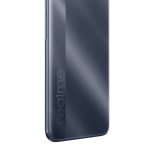
The implementation of the International Electrotechnical Commission’s new IEC 62368-1 safety standard for consumer electronics is prompting many manufacturers to seek higher-performing flame-retardant (FR) materials. Realme, a leading Chinese smartphone manufacturer, has selected Sabic’s new LNP Elcres EXL7414 copolymer resin for the battery enclosure of its C25 phone to achieve UL 94 V0 FR compliance at 0.6mm, addressing the new IEC standard. Additionally, the superior flame retardance of the new LNP copolymer resin supports its potential use in ultra-thin-wall components to help save device weight and space in ever-thinner designs. Sabic’s LNP Elcres EXL7414 copolymer resin also delivers excellent flow for thin-wall molding; ductility to resist damage from drops; and good chemical resistance to withstand ultraviolet (UV)-cured painting. The new Realme smartphone launched in March 2021.
“To help customers like Realme stay ahead of global regulatory changes, Sabic will continue to develop the specialized materials they need to support compliance,” said Joshua Chiaw, Director, Business Management, LNP & NORYL, Sabic. “In addition to our growing portfolio of breakthrough materials, Sabic offers our customers a wealth of technical services and expertise to help drive their application development needs in this fast-paced industry.”
Superior Flame Retardance at Ultra-thin Gauges
The international, harmonized IEC 62368-1 standard replaces the previous IEC 60065 Audio Video and IEC 60950 IT Equipment standards, strengthening safety requirements. For example, this new standard, which took effect in December 2020, requires hazardous energy sources such as lithium-ion batteries to be contained via built-in safeguards to help prevent the energy from transferring to device users.

The Realme C25 smartphone features a fast-charging, high powered 6000mAH lithium-ion battery. To contain this powerful battery, the company uses a flame-retardant, injection-molded cover made of Sabic’s new LNP Elcres EXL7414 copolymer resin. In alignment with the industry’s continued focus on miniaturization, the C25 phone was designed to be thin (approximately 9.6mm) and light (approximately 209 grams).
To help reduce product weight and maximize space for internal components, Realme wanted an ultra-thin-wall battery cover that could still comply with the IEC standard. The company was the first consumer electronics brand to adopt Sabic’s Elcres EXL7414 resin. This new polycarbonate (PC)-based copolymer material replaces standard PC and provides superior FR capability defined as UL 94 V0 at 0.6mm. As part of its safety value, LNP Elcres EXL7414 resin uses a non-chlorinated, non-brominated FR formulation.
In addition to supporting ultra-thin-wall designs, the excellent flowability of Sabic’s new LNP Elcres EXL7414 copolymer resin offers opportunities for shorter cycle times and higher throughput vs. standard PC. This material also provides excellent low-temperature ductility (-40℃) for resilience when dropped, and good chemical resistance to secondary painting. It is available worldwide in a wide range of opaque colors.
“Sabic’s outstanding research and development team works closely with customers to quickly find creative solutions to their requirements, from higher performance to compliance with new regulations,” said Jenny Wang, Director, Formulation & Application, APAC, Sabic. “We apply our deep industry knowledge to keep pace with the latest trends, such as the drive toward thinner, smaller and more-powerful consumer devices. Our collaboration with Realme perfectly illustrates the effectiveness of matching materials innovation to customer needs.”



